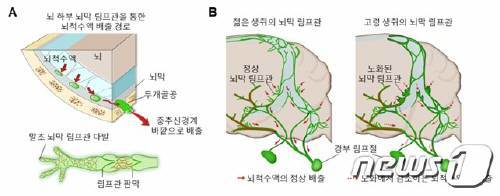S. Korean scientists discover brain wastes’ discharging routes
S. Korean scientists discover brain wastes’ discharging routes
Posted July. 25, 2019 07:35,
Updated July. 25, 2019 07:35

A team of South Korean scientists have discovered the mechanism of discharging wastes from the brain that cause dementia. Cerebral wastes are byproducts generated by the brain’s metabolism. Accumulated in the brain, they cause degenerative brain diseases. The team’s research raises the expectation as to whether it will make a breakthrough in developing a new medicine to cure brain diseases.
The team, led by Dr. Koh Gou-young, director of the Center for Vascular Research at the Institute for Basic Science, found that the major channel through which cerebral wastes are discharged from the brain is the meningeal lymphatic vessels located in the lower part of the brain, publishing the research results in the international science journal Nature.
The meninges are three membranes that envelop the brain and nerve surfaces. They keep other materials or pathogens from entering the brain. Lymphatic vessels are the passages through which immunologically competent cells and body fluids move.
Dr. Koh’s research team injected fluorescent materials into the cerebrospinal fluids of mice to trace the route of their discharges through magnetic resonance imaging. As a result, the scientists confirmed that metabolites accumulated in the brain are discharged through the meningeal lymphatic vessels located in the lower part of the brain. The result overturns the previous studies that assumed arachnoid villi in the upper part of the brain as the major exit.
The team also confirmed how and why metabolites fail to be properly discharged with aging. An analysis of laboratory mice showed that the meninges in the lower part of the brain grew abnormally big with aging. Attributing the abnormality to the ruining valves, or structures that controls the flow of body fluids, the team presumed that the disruption blocks the lymphatic vessels, affecting the discharges of into the cerebrospinal fluids.
“If a medicine that improves the discharging functionality of the meningeal lymphatic vessels located in the lower part of the brain is developed, it could cure new degenerative brain diseases,” Dr. Koh said.
ashilla@donga.com







